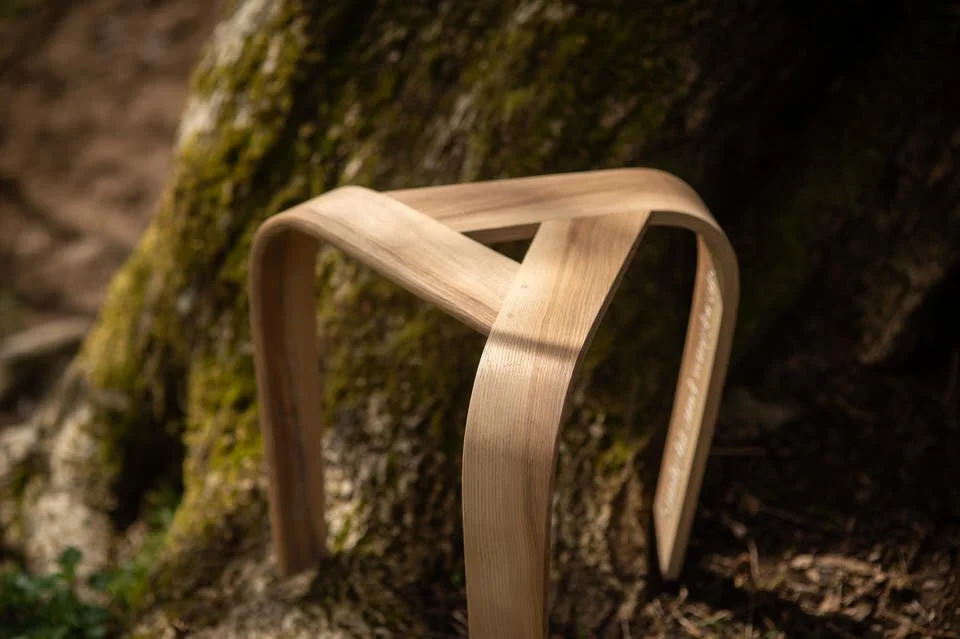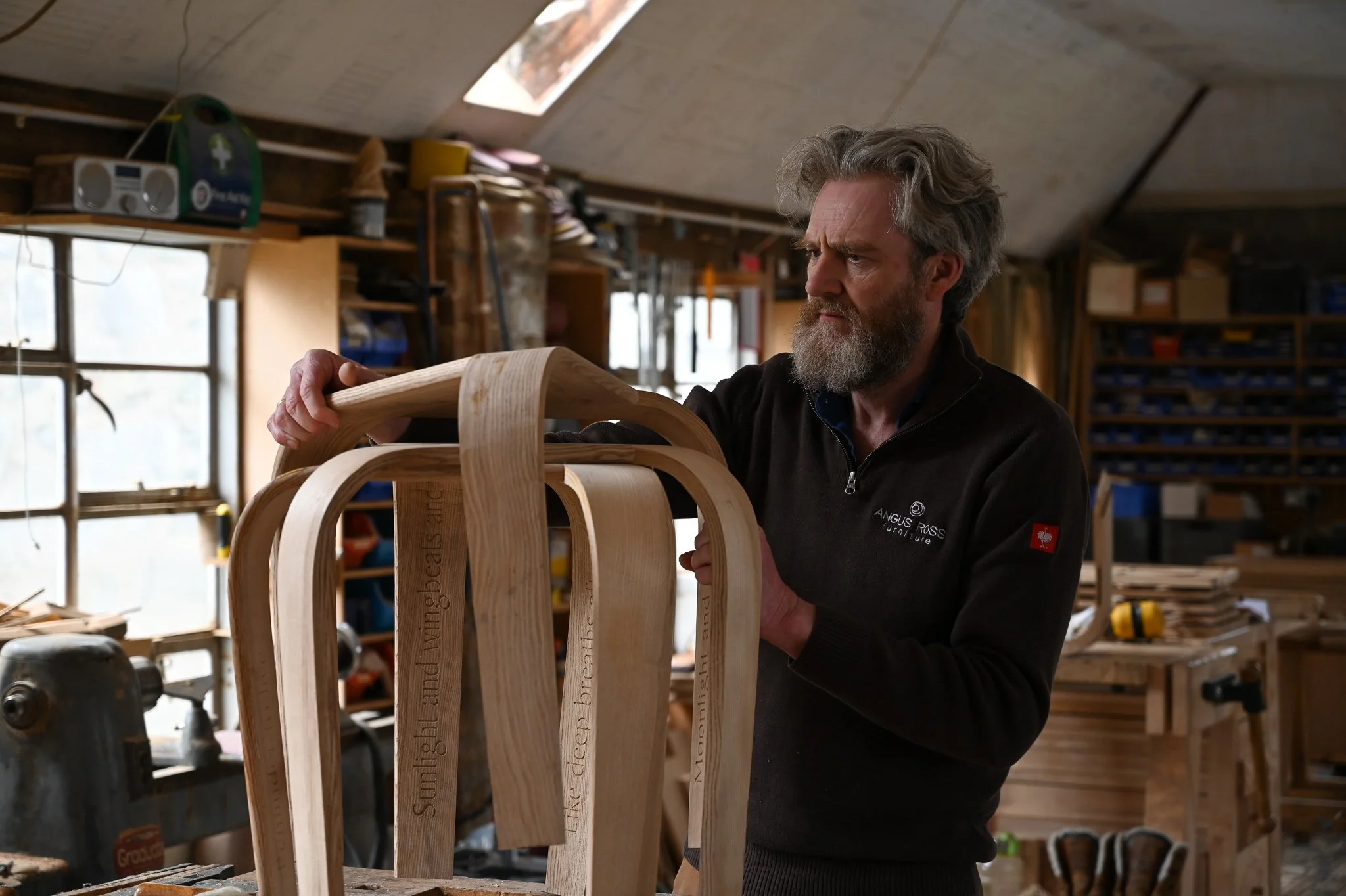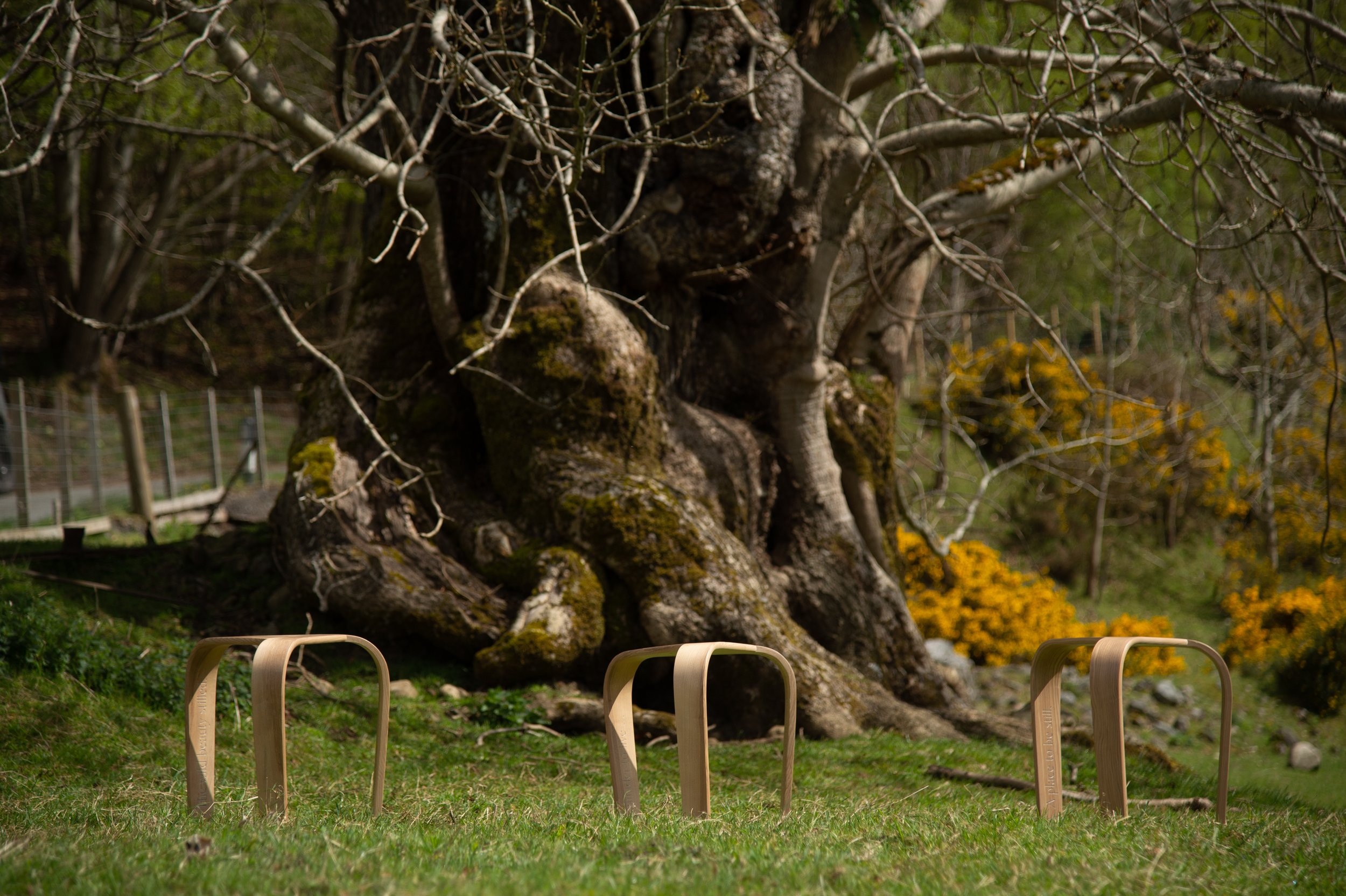Haiku Stools at LDF
Our Haiku Stools are on Homes with a Heart stand, curated by Roddy Clark for Bluepatch, during London Design Fair 21 - 24 September, Truman Brewery London. (Stand 1B41 in Hall 1 - upstairs near the cafe).
The thoughtful design is a homage to our native ash trees, and a collaboration with our friend and poet Jon Plunkett.
The design is an exercise in simplifying to essential elements. One component is repeated three times to create a simple, stackable stool.
“To get timber furniture to look simple you have to think quite a lot about it... Flowing forms are really challenging”
The idea of using three bent legs to create a stool came to Angus during summer 2021 when he made the first prototype. Bending wood into a simple functional shape reduces waste and uses the strength of woods in the most effective way possible (with the fibres under compression). The three angled mortice and tenon joints are also very efficient and strong. As the stool developed Angus thought ‘this is a bit like a haiku with three simple, concise lines’ - and he asked local poet, forester and friend Jon Plunkett to write some haikus to be engraved into the stools.
I
Absorbed in this grain
Sunlight and wingbeats and wind
The wild beauty stilled
II
Reminder to live
Like deep breaths after spring rain
Goodness lives and grows
III
Moonlight and sunlight
Infused now with finished wood
A place to be still
Jon Plunkett.
Haiku often capture a fleeting moment in time. Jon has captured the years of living and growing embodied in a mature ash tree transformed into a modest stool. The wood will live on, perhaps even longer than its rooted years.
Haiku Stools Stacking Set photographed by James T Millar beside The Glen Lyon Ash (thought to be the oldest ash tree in Scotland).
The Haiku Stools are made in ash, and the first set from a veteran ash tree felled by Loch Rannoch fifteen years ago. We are often offered wood from local people. In this case, we know who felled and milled the tree, and the good intension to have something made eventually realised. New orders will be made from an ash tree felled by Comrie Perthshire.
We are particularly keen to use ash as most trees in the UK are now threatened by Ash Die Back Disease. In 2016 we responded to this with the Resilience Bench (purchased by the Royal Botanic Garden Edinburgh) and we have been watching with sadness the effect in our own garden, woodland, and wider landscape. Rick Worrell is a member of the collective who own our woodland, and an adviser to Forestry Commission Scotland. After identifying one infected tree in 2014 he began carefully observing 700 self-seeded young ash saplings on a steep banking in our wood, The next year there were 28 infected trees and in the the following year 350 infected. Now only about 30 (5%) are unaffected. In a large study by Forestry Commission Scotland 150,000 ash saplings were planted and after five years only 570 were healthy (0.5%). Young trees are more susceptible but mature trees are now being affected and The Woodland Trust expects 80% of ash trees to be lost.
As ash trees are lost we also lose the lichens, mosses and liverworts that live on the bark, and the insects and birds, and micro-organisms in the soil associated with them. This is particularly problematic as ash were able to fill a niche already diminished after Dutch Elm Disease.
Mycologists have identified the disease as arriving in Europe with imported trees from Asia. These imported trees had resistance to the disease, developed over thousands of years, and highlights the exquisite balance within local ecosystems. It is particularly sad that intensively cultivated trees are imported as our native trees are easy to grow. It is important to nurture and protect our precious native woodlands.
Talking to foresters is interesting, as their sense of time is expanded as the life-time of trees means they plan decades and even centuries ahead. There will be a dramatic decline in ash for decades but eventually they may be replaced by off-spring from our naturally resistant trees, or by off-spring from hybrids with resistant Asian trees. In the meantime the gaps in our landscape will be filled by other trees, shrubs and plants.
The ash wood can still be used for fine furniture making and by using this wood we support the work of the specialist foresters, tree surgeons, and saw-millers who work with native trees. Most dying trees will degrade back into the soil, many will be felled for firewood and a precious few will be carefully and individually processed for furniture making.
The Haiku Stools are available to buy in our shop and at Homes with a Heart during London Design Fair 21-24 September in the Truman Brewery, Hall 1 beside the cafe.







